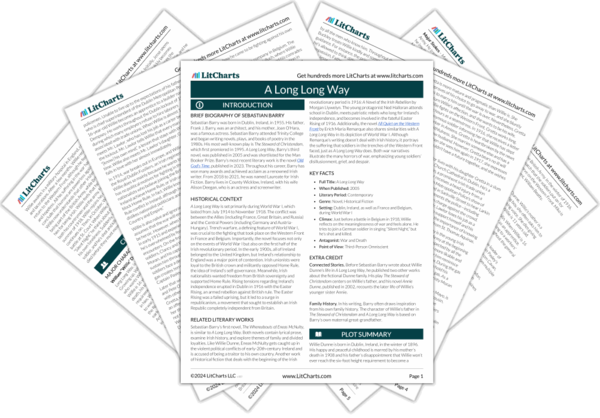Throughout the novel, Willie Dunne’s relationships sustain him as he faces different hardships. As a 17-year-old boy living in Dublin, he clings to his late mother’s memory, cares affectionately for his three younger sisters, and bears an unshakeable love for his father. He also falls in love with Gretta Lawlor, a girl whom he finds angelically beautiful and wants to marry. After Willie leaves Ireland to fight in World War I, his experiences on the Western Front sharpen his love for his family and girlfriend at home, making his relationships with them even more precious and motivating him to keep fighting. Additionally, the war offers Willie opportunities to forge new relationships with fellow soldiers. The deep, meaningful emotional bonds Willie shares with his comrades anchor him, lift his spirits, and help him survive the horrors of war.
As important as Willie’s relationships are, none of them are straightforward, easy to navigate, or wholly positive. Willie sincerely respects his father, but he can’t fulfill his father’s strict expectations or agree with his father’s steadfast loyalty to the King of England. This causes strife in their relationship. Similarly, Willie loves his fellow soldiers, but he must confront the disturbing truth that even his closest friends are capable of horrific deeds. And Willie adores Gretta, but he loses his opportunity to have a relationship with her in the end. Yet, even with these difficulties, Willie’s fundamental love for his family, comrades, and Gretta never fades. Gretta, Willie’s father, and Willie’s fellow soldiers all continue to love him as well. Through Willie’s relationships, the novel illustrates the value of love and the benefit of human connection, especially in times of suffering—and it suggests that relationships need not be perfect to provide comfort.
Family, Camaraderie, and Love ThemeTracker

Family, Camaraderie, and Love Quotes in A Long Long Way
Then Willie found John Williams, Joe Clancy, Joe McNulty. A dozen men and more who had been bound to him by some bond he didn’t know the explanation of. Willie’s very stomach was torn by sorrow, his very eyes were burned by sorrow, as if sorrow itself were a kind of gas.
And it did Willie Dunne more good than food to open his mouth and heart and sing “Tipperary,” the long line of men bawling it out.
So James Patrick, a man of six foot six, stood his son William, a man of five foot six, into the steaming zinc bath […] and he started to lave his son from head to foot, cascading the water neatly over everything. And the lice must have been flying from Willie Dunne just like those poor men in Sackville Street from the batons, and soon the water speckled with them, little writhing white creatures.
Suddenly the enemy guns opened their filthy cursing mouths and belched forth a ruinous misery of shells. […] But the men didn’t drop a stitch of the Hail Mary they were halfway through knitting, one soothing word to the next.
Willie’s mind now leaped to think, to remember, the tone of a child in a room in Dalkey singing to his mother, after the birth of his sister Dolly that killed her, […] “Ave Maria, full of grace, the Lord is with thee,” and his mother’s face not listening and listening, and similarly now he sang for these ruined men.
Was O’Hara a child thrown among blood and broken souls? Was O’Hara his brother too, if Jesse Kirwan was? Was the family of mankind in all of itself the enemy?
“You can know your own mind and your father can know his.”
“But my father and me always had the one mind on things. That’s the trouble, I think—I don’t even know. I’m confused, Father.”
“I don’t fucking want [the medal]. You earned it just as much, you stupid cunt. Anyhow, Willie, it has a little harp on it and a little crown, and I reckon between the two it might get you home safe.”
“It’s a funny, dark world out at the war, Papa,” said Willie slowly. “It brings your mind to think a thousand thoughts, a thousand new thoughts.”
“I won’t stand here and listen to your villainy!” shouted his father.
He missed them all. He missed them when they were killed. He sorrowed to see them killed, he sorrowed to go on without them, he sorrowed to see the new men coming in, and to be killed themselves, and himself going on, and not a mark on him, and Christy Moran, not a mark, and all their friends and mates removed.
He closed his eyes and Gretta’s face slowly filtered in. All the ache and murder of the last years just for a moment ceased—ceased to write itself in the history of his addled blood. He hung suspended, beautifully aloft, somewhere, he knew not where, with Gretta’s face, her breast, her arms about him. He was surprised by the soft silence, as if his brain had been a noisy place lately.











